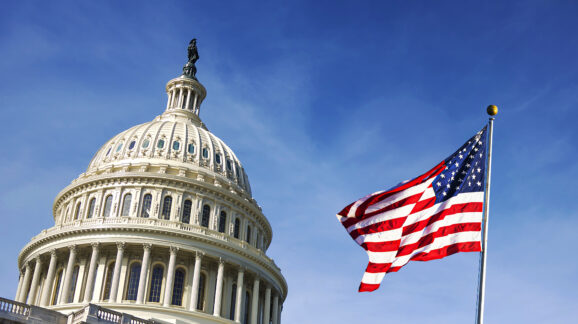Congress in a post-Chevron world

Photo Credit: Getty
The House Committee on Administration conducted a regulatory reform hearing today entitled “Congress in a Post-Chevron World.” The title refers to the anticipated sea change in the conduct of the Administrative State following the June 28, 2024 Loper Bright Enterprises v. Raimondo decision marking the end of the Chevron deference doctrine.
Chevron deference, established by the 1984 Chevron U.S.A., Inc. v. Natural Resources Defense Council, Inc. decision, had required courts to defer to federal agencies’ reasonable interpretations of ambiguous statutes. The majority Loper opinion concluded that such deference compromises the separation of powers, unduly increasing executive authority while diminishing judicial oversight.
I had the opportunity to testify and make, as I am prone to do, Fred Smith’s utterly unique hardcore case for sweeping regulatory liberalization and limiting federal powers as such. Pasted below is a slightly modified version of my spoken remarks; the link to my full written testimony is available at the Committee’s hearing landing page.
————
Chairman Steil, Ranking Member Morelle, and members of the Committee, thank you for the opportunity to testify on Congress’s role in a post-Chevron world. My name is Wayne Crews, and I am the Fred L. Smith Jr. Fellow in Regulatory Studies at the Competitive Enterprise Institute.
Federal spending hogs the spotlight, but the hidden tax of regulation affects every aspect of our lives. The Code of Federal Regulations tops 188,000 pages.
In 2023 alone, agencies issued 3,000 rules compared to just 65 public laws passed by Congress. Costs remain unaccounted for, notably those from independent agencies now ascendant in whole-of-government pursuits like climate crisis and net-zero energy, AI, equity and competition policy.
Congress must reclaim its lawmaking authority from the executive branch, but first and foremost, it must restrain its own interventionist appetites.
There are many elements to this in my written remarks, but they all require that Congress and this Committee in particular marshal appropriate resources and personnel to perform rigorous regulatory oversight and disclosures, replacing the eroded White House variant.
The end of Chevron deference marks an overdue reaffirmation of separation of powers and a brake on over-delegation. However, it is crucial to recognize the extent to which regulatory advocates will mobilize in response. While extraordinary expansions of regulatory power occurred during Chevron’s reign, most of the leverageable administrative apparatus was erected long before and remains intact.
Especially since COVID, the problem is less about agency interpretation of the ambiguous statutes at hand in Loper than agencies’ implementation of unambiguous statues. The Biden-era Inflation, Infrastructure and CHIPS laws are exceedingly regulatory even before administrators pick up a pencil.
Therefore workarounds exist for regulatory advocates to exploit in a post-Chevron world, including:
- One, more coordination on potent, unambiguous and purpose-driven legislation like the CARES Act and the TikTok ban;
- Two, seducing the private sector with subsidies, grants, and partnerships to yield to interventionist legislation and cartelization;
- Three, increasing federal influence with hundreds of billions in procurement and contracting;
- And Four, replacing notice-and-comment rules with guidance documents other regulatory dark matter.
To prepare, an outstanding but neglected new GAO report provides recommendations for oversight that this Committee should heed, up to and including establishing a Congressional Office of Regulatory Analysis. Done properly, a CORA would challenge mistaken premises of agency expertise, and avoid the faulty presumption that market failure outweighs political failure.
To reinforce GAO, other needed steps include overturning Biden’s rewrite of OMB’s Circular A-4, and ensuring that regulatory reform laws already in effect but disregarded get enforced.
Next comes the pursuit of several new legislative reforms:
- One, passing the REINS Act, ideally under its predecessors’ superior name, the Congressional Responsibility Act.
- Two, taking up the Democrats on their marvelous regulatory budgeting idea.
- Three, creating a bipartisan Regulatory Reduction Commission.
- Four, reinstating “one-in, two-out” policies and sunsetting regulations.
- Fifth and most importantly, reforms in the use of agency sub-regulatory guidance documents, including banning them.
- Finally, the low-hanging fruit would be annual regulatory reporting in the style of the federal budget’s historical tables.
A generation ago, a slate of regulatory reforms benefiting state and local governments, small business, and consumers passed with overwhelming bipartisan support.
But in today’s fusion of hyper-spending and regulation, government steers while the market merely rows, as CEI founder Fred Smith puts it. Costs of intervention compound even without the writing of notice-and-comment rules.
Correcting over-delegation is vital, but the real challenge is Congress’s own disregard for enumerated powers. Response requires decentralization, restoration of federalism, and ending the abuse of crises as occurred with COVID and the financial meltdown.
By enhancing resources and fostering reforms, this Committee can play a key role in limiting over-regulation and expanding jobs and wealth. You don’t need to tell the grass to grow, but you do have to take the rocks off of it. Thank you again for inviting me to testify. I look forward to your questions.